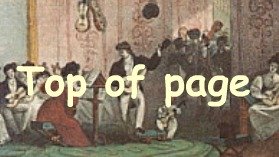The History of
the Scherzo
Light-hearted music
A scherzo (plural scherzi) is particular style and from of music developed from the minuet. It often used as the third movement of sonatas and symphonies. The Italian word scherzando is an adverb meaning 'playfully' or 'jokingly', 'scherzo' having the same root and being a noun meaning 'a joke'. Use of similar words in music in Renaissance times include 'scherzi musicale', which described a 'light-hearted madrigal', this title was employed by Claudio Monteverdi (1567-1643) in two sets of his works. Johann Sebastian Bach (1685-1750) also employed the word in his Partita no.2 for harpsichord. As mentioned previously the scherzo developed from the minuet, and gradually came to replace this style as the third or second movement in symphonies, sonatas and similar works. The tempo of the scherzo is generally quicker than that of the minuet, but retains a triple meter time signature and ternary form.The scherzo itself is a rounded binary form; but, like the minuet, is usually played with the accompanying Trio followed by a repeat of the Scherzo, creating the ABA or ternary form. This is sometimes done twice or more (ABABA). The "B" theme is a trio, a contrasting section not necessarily for only three instruments, as was often the case with the second minuet of classical suites (the first Brandenburg concerto has a famous example).
Marche et Scherzo by Napoleon Coste performed by Candice Barnes - oboe, and Arash Noori - guitar
A technique that exists in some, but not all, scherzi is transposition of a repeated phrase. For example, in the second movement of Beethoven's Moonlight Sonata, the first four measures are played in the dominant key. The four measures following that are a repeat of the first four, but transposed up a perfect fourth to the tonic key. This effect creates the illusion of starting on the 'wrong' key, which corrects itself after the phrase is transposed.
Ludwig van Beethoven's Moonlight sonata (op.27 no.2) performed by Laurindo Almeida (audio only)
Other Musical forms :
- The Caprice
- The Ecossaise
- The Etude
- The Waltz
- The Polonaise
- The Rondo
- The Caprice
- The Scherzo
- The Sonata
- The Fantasia
- The Passacaglia
- Variation
- The Etude






